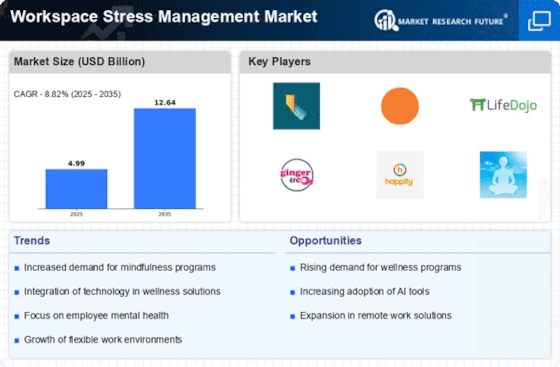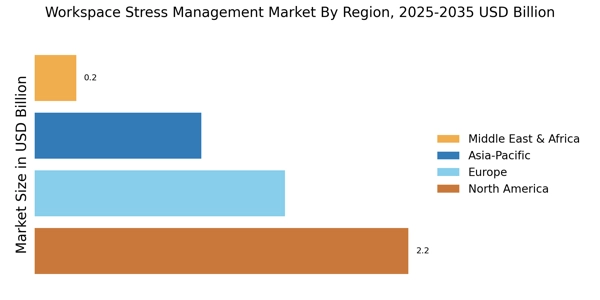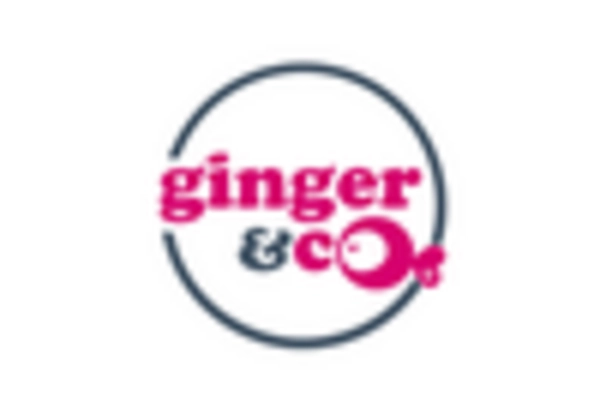Growing Demand for Work-Life Balance
The rising demand for work-life balance is significantly influencing the Workspace Stress Management Market. Employees are increasingly seeking jobs that allow them to maintain a healthy balance between their professional and personal lives. This demand has prompted organizations to implement policies that support flexible working hours, remote work options, and wellness programs aimed at reducing stress. Studies indicate that companies that promote work-life balance experience higher employee satisfaction and productivity levels. As this trend continues to gain momentum, the market for stress management solutions is likely to grow, as organizations strive to meet the expectations of a workforce that values mental health and well-being.
Rising Awareness of Workplace Mental Health
The increasing awareness surrounding mental health issues has become a pivotal driver in the Workspace Stress Management Market. Organizations are recognizing the profound impact of stress on employee productivity and overall well-being. According to recent studies, nearly 80% of employees report experiencing stress at work, which can lead to decreased performance and higher turnover rates. This awareness has prompted companies to invest in stress management programs, workshops, and resources aimed at fostering a healthier work environment. As a result, the demand for innovative stress management solutions is surging, with the market projected to grow significantly in the coming years. This trend indicates a shift towards prioritizing mental health as a core component of workplace culture, thereby enhancing employee satisfaction and retention.
Regulatory Support for Mental Health Initiatives
Regulatory frameworks supporting mental health initiatives are emerging as a significant driver in the Workspace Stress Management Market. Governments and regulatory bodies are increasingly recognizing the importance of mental health in the workplace, leading to the implementation of policies that encourage organizations to adopt stress management practices. For example, some regions have introduced mandates requiring companies to provide mental health resources and support systems for employees. This regulatory support is likely to enhance the credibility of stress management programs and encourage more organizations to invest in these initiatives. As compliance becomes a priority, the market for stress management solutions is expected to expand, driven by the need for organizations to meet regulatory standards while promoting employee well-being.
Shift Towards Employee-Centric Work Environments
The Workspace Stress Management Market is witnessing a notable shift towards employee-centric work environments. Organizations are increasingly adopting policies that prioritize employee well-being, recognizing that a supportive atmosphere can mitigate stress levels. This shift is reflected in the growing trend of implementing flexible work arrangements, mental health days, and wellness programs. Research indicates that companies with strong employee well-being initiatives experience up to 30% lower turnover rates. As businesses strive to create a culture that values mental health, the demand for stress management solutions is expected to rise. This trend suggests that organizations are not only focusing on productivity but also on fostering a holistic approach to employee satisfaction.
Technological Advancements in Stress Management Solutions
The integration of technology into stress management practices is transforming the Workspace Stress Management Market. With the advent of mobile applications, wearable devices, and online platforms, organizations are now able to offer personalized stress management solutions to their employees. For instance, the use of AI-driven analytics can help identify stress patterns and provide tailored interventions. The market for wellness technology is expected to reach substantial figures, with projections indicating a growth rate of over 20% annually. This technological evolution not only enhances the accessibility of stress management resources but also empowers employees to take charge of their mental health. Consequently, companies that leverage these advancements are likely to see improved employee engagement and productivity.

















